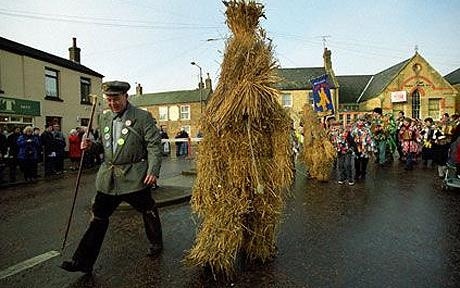Without even fully knowing what form The English Journey Reimagined will take when presented next weekend at the Barbican, consider us intrigued. Essentially a collaboration between site favourite Iain Sinclair, Watchmen creator Alan Moore and a handful of visionary artists, writers and musicians, it sounds like the kind of rolling conversational collaboration that we’re suckers for (as anyone who’s been to any of our events or Port Eliot symposiums will attest). No one deals with the vast, kaledoscopic subject of London like Sinclair (who describes the evening below) – here’s hoping he and his collaborators bring the same forensic, slightly psychedelic attention to detail to the rest of the country.
Iain Sinclair on The English Journey Reimagined. “The idea of the English Journey was to take a kind of travelling circus of people from different disciplines – music, film, writing, visual art – on a British tour, with Alan Moore, and Susan Stenger, F.M. Einheit, Graham Dolphin, producer Paul Smith and myself as constants and various other people joining us in different places. The idea was that you stay in different locations and absorb material from those areas, and then produce something site-specific. We did two events last year – one at Adleburgh Music’s Faster Than Sound Festival and the other in Newcastle at AV2010, and this show will feature highlights from both.
It’s a nice idea, for me, to come back to the Barbican, on my doorstep, for a the final show because we also did a really interesting thing here in 2002 after my book on the M25, “London Orbital”, came out, and many people who featured in the book were in the show, like Bill Drummond and Jimmy Cauty and Bruce Gilbert from Wire… So in a sense this isn’t just a return to London but also a return to that particular kind of event – which is now getting harder and harder to do. It was always a vision, that writers and the spoken word could integrate with music into these kind of multiform disciplines, and this is a good place to do it.
You can get a kind of communal identity from bringing together a disparate group of people who would never normally work together, and pushing them into this cauldron where they have to fuse and they have to find some central metaphors that work. For this one, it is the idea of the road, the journey, the walking, the madness – and with the musicians that builds into apocalyptic noise, which is scavenged from the streets, with spanners being chucked on metal, and flying objects, all of that. It’s quite dramatic.
Alan Moore works in Northampton where he manages to squeeze cosmic juices out of a very small strip of land, and I’ve tried to do the same in Hackney, and in a sense we’re dragged blinking out into the light to be confronted by something on a big, theatrical scale, which is quite a challenge. It’s a way of road-testing certain kinds of writing and giving it an exposure that you’re never going to get through the published word.
It’s well worth anyone taking a tour of the Barbican itself. It’s one of those London accidents – you come out of the war and you create something peculiar and mysterious. It’s a wonderful place to get lost – I’ve been coming here for years and I still manage to lose myself – so you will stumble across spaces as strange as an indoor garden, a jungled area, very hot and humid, right in the middle of this building where they have events from time to time. Or you go outside and you can see the church where Milton got married across a strip of water full of reeds and ducks, as if you were in the countryside. And it’s also got the feeling of a bunker, and the feeling of the RSC in the 1960s – it’s got all of these things integrated into it. I was thinking today that it’s one of those bits of London that really shouldn’t work, but it does and it’s an entity in itself, and yet it doesn’t have that protected feeling that you get with so many modern buildings which are all reflection and feel like they’re designed to repel you, to not let you in. This does let you in, it’s quite welcoming, you just drift in and use it as a space – and I’d recommend it to anyone.”
Listen to Iain Sinclair on the Barbican podcast here.
To win a pair of tickets for the English Journey, just name the London borough that acts as home and muse to Iain Sinclair and mail info@caughtbytheriver.net – competition closes midnight Wednesday.
